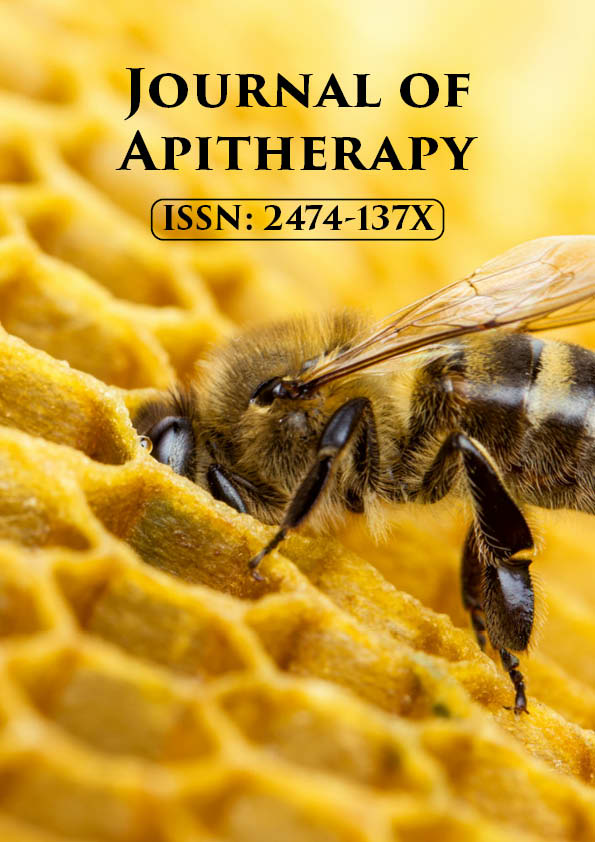Opinion Article - Journal of Apitherapy (2023)
Beeswax Dermoprotective: Nature's Shield for Skin Health
Mahmud Khan*Mahmud Khan, Department of Pharmaceutical Sciences, University of Science and Technology Chittagong, Chattogram, Bangladesh, Email: Mahmud@gmail.com
Received: 09-Sep-2023, Manuscript No. JAPITHERAPY-23-122293; Editor assigned: 11-Sep-2023, Pre QC No. JAPITHERAPY-23-122293 (PQ); Reviewed: 25-Sep-2023, QC No. JAPITHERAPY-23-122293; Revised: 02-Oct-2023, Manuscript No. JAPITHERAPY-23-122293 (R); Published: 09-Oct-2023
Description
Beeswax, a natural substance produced by honeybees, has been treasured for centuries for its versatility and therapeutic properties. Among its various applications, beeswax stands out as a powerful ingredient in skincare due to its dermatoprotective qualities. This article delves into the composition of beeswax, its historical significance, and the myriad ways in which it serves as a protective shield for the skin [1,2].
Composition of Beeswax
Beeswax is a complex mixture of lipids, esters, and hydrocarbons, primarily secreted by worker honeybees to build and maintain the structure of their hives. The composition of beeswax includes fatty acids, alcohols, and various other compounds, contributing to its unique characteristics. This natural substance is solid at room temperature but becomes pliable with warmth, making it an ideal ingredient in skincare formulations [3,4].
Fatty Acids: Beeswax is rich in fatty acids, such as myristic, palmitic, and oleic acids, which contribute to its emollient properties. These fatty acids help soften and hydrate the skin, making it an excellent choice for moisturizing products.
Esters: Esters found in beeswax contribute to its stability and texture. They play a crucial role in creating a protective barrier on the skin's surface, shielding it from environmental stressors.
Hydrocarbons: The hydrocarbons in beeswax give it a water-repellent quality, helping to lock in moisture and prevent dehydration. This aspect is particularly beneficial for individuals with dry or sensitive skin.
Beeswax Dermoprotective Properties
Natural moisturization: Beeswax functions as a natural emollient, sealing in moisture and preventing water loss from the skin. This is particularly beneficial for individuals with dry or dehydrated skin, as regular use of beeswax-based products helps maintain skin hydration [5].
Barrier Function: One of the key dermatoprotective qualities of beeswax is its ability to create a barrier on the skin's surface. This barrier acts as a shield against environmental pollutants, harsh weather conditions, and irritants, reducing the risk of skin damage.
Soothing and Healing: Beeswax possesses soothing properties, making it an ideal ingredient for addressing skin inflammation and irritation. Its gentle nature makes it suitable for individuals with sensitive skin, and it may aid in the healing of minor cuts and wounds.
Sun protection: While not a substitute for dedicated sunscreens, the occlusive nature of beeswax provides a degree of sun protection by forming a protective layer on the skin. This can be particularly helpful in preventing moisture loss and minimizing sun damage [6].
Beeswax in skincare products
Lip balms and salves: Beeswax is a common ingredient in lip balms and salves due to its moisturizing and protective properties. It helps combat dry and chapped lips, providing a natural barrier against harsh weather conditions.
Moisturizers and lotions: Many moisturizers and lotions incorporate beeswax to enhance their hydrating effects. The occlusive nature of beeswax ensures that moisture is retained in the skin, promoting a soft and supple complexion.
Ointments for eczema and psoriasis: The anti-inflammatory and soothing properties of beeswax make it a valuable component in ointments designed for individuals with eczema, psoriasis, or other inflammatory skin conditions. These formulations aim to alleviate symptoms and support skin healing.
Candles and massage products: Beeswax candles, with their natural aroma and clean-burning properties, have gained popularity. Additionally, beeswax is often used in massage products for its smooth texture and skin-conditioning benefits.
Beeswax, with its rich history and dermatoprotective properties, remains a stalwart in skincare formulations. From ancient civilizations to modern beauty routines, the natural benefits of beeswax have stood the test of time. Whether as a moisturizing agent, a protective barrier, or a soothing balm, beeswax continues to play a vital role in promoting skin health. As consumers increasingly seek natural and sustainable skincare options, the enduring allure of beeswax is poised to persist, reminding us that sometimes the most effective solutions come from the simplicity of nature.
References
- El-Seedi HR, Eid N, Abd El-Wahed AA, Rateb ME, Afifi HS, Algethami AF, et al. Honey bee products: Preclinical and clinical studies of their anti-inflammatory and immunomodulatory properties. Front Nutr 2022;8:761267.
[Crossref] [Google scholar] [Pubmed]
- Münstedt K, Männle H. Using bee products for the prevention and treatment of oral mucositis induced by cancer treatment. Molecules 2019; 24:3023
[Crossref] [Google Scholar] [pubmed]
- Olas B. Bee products as interesting natural agents for the prevention and treatment of common cardiovascular diseases. Nutrients 2022; 14:2267
[Crossref] [Google Scholar] [Pubmed]
- Luo X, Dong Y, Gu C, Zhang X, Ma H. Processing technologies for bee products: An overview of recent developments and perspectives. Front Nutr 2021; 8:727181
[Crossref] [Google Scholar] [Pubmed]
- Dumitru CD, Neacsu IA, Grumezescu AM, Andronescu E. Bee-derived products: Chemical composition and applications in skin tissue engineering. Pharmaceutics 2022;14:750.
[Crossref] [Google scholar] [pubmed]
- Münstedt K, Männle H. Bee products and their role in cancer prevention and treatment. Complement Ther Med 2020; 51:102390
[Crossref] [Google Scholar] [Pubmed]







